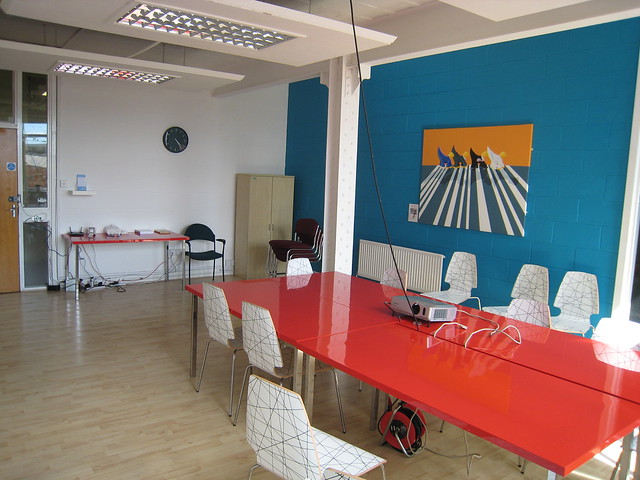Unfortunately this isn’t going to be one of those posts where I show you lots of graphs telling you how the DoES finances are doing, it is going to be a post where I talk about money though. Overall the DoES finances are doing ok but they could certainly be healthier. This time last year we had about £16,849.84 in total assets. At the end of April that figure is £10,194.39. We’ve not actually had any big unusual or unexpected expenditure over the last year, looking at payments of over £300 it’s mostly rent, service charge, business rates, salary, electricity and water bills. We’ve had a few one-off expenses such as 3D printer parts, buying the laser filtration machine, accountancy fees and insurance but only the laser filtration machine was particularly expensive or unusual, and you couldn’t really call it unexpected given we got a grant of £1000 for it in 2022!
Regular Expenses
Regarding the regular expenses, all of those did go up over the last year. Our business rates valuation nearly doubled from the ridiculous £21,250 to the utterly outrageous £38,750 (remember we are expected to pay about half that figure). Fortunately we were automatically entitled to transitional relief which means the increase in what we paid was less, but that relief reduces each year so what we pay will be going up again this financial year. It’s actually the same scenario regarding our rent. Our initial lease of 5 years ended last year and with the new lease came a new rent. This also is tiered to reduce the impact but again, we’re a year in so it has increased again. Service charge went up because of the various lift issues we had in the previous year and continues to rise to cover the cost of the new lift being installed. The one bright spot now is the electricity bill which, while high over the last year, will now be lower as a 1 year fixed price contract came to an end in early 2024 and the new contract was for a lower amount.
Turnover and VAT
You can probably see where I’m going with all this, but before I say it out loud I have something else to mention. Our turnover in the last year was £73,977.00. We’ve started tracking this because we were concerned that we might hit the threshold where we’re legally required to register for VAT. In the past that threshold was £85,000 but in fact this has recently been increased to £90,000. Right now we’re still a way off hitting that but it’s still something to be aware of.
We can register for VAT at any point and doing so would allow us to claim relief of the VAT on our outgoings; most of those are VATable, including rent and utilities, but wouldn’t include rates or Sean’s salary. We would of course have to charge VAT on our “sales”, although we can choose how much of that (including “all”) to absorb into our current prices.
Upcoming Expense
The final thing to mention is that we do have a large expense that we’re going to need to make in the next few months. The air conditioning units that we use in the main workshop to heat and cool the space have always been rubbish, but now one of the units has broken down and we have been told that it’s not going to be possible to fix this, and that we would be better off getting a new pair of units which should actually provide useful heating and cooling of the space. The cost of this is £5153.55+VAT (£6,184.26 total) plus some electrical work, and we need to cover it entirely ourselves.
What should we do?
Well the obvious thing to do when your costs go up is to raise your own prices. We’d really prefer not to do this as providing low cost access to our equipment and space is our entire reason for existing. That said it does look unavoidable at the moment. If we’re going to change our pricing though it would make sense to have a discussion around whether to register for VAT at the same time. It’s unlikely to save us money but it makes sense to make changes to the prices once, rather than change them now and introduce VAT related changes in 6 months time.
The alternative to raising our prices would be to reduce our costs. Right now we’re somewhat limited in how we can do this. Even as it increases our current rent is actually pretty reasonable. Finding an alternative or additional space has long been a consideration but unfortunately we’re struggling to make any progress on this front (or even find time to try). There could even be an option around restructuring the company that is Does Liverpool CIC, splitting into multiple parts that run different areas, maybe one of which would be a charity, all of which would have different business rates liabilities (and relief). We are very proud of running DoES Liverpool as a sustainable business (in terms of it sustains itself through it’s operations rather than being reliant on external funding) so machinations like that don’t feel like the ideal way or a particularly long term solution.
Let’s talk
So what should we do. Answers on a post card? This blog post is really intended as the start of a conversation, if you have thoughts please post them on our mailing list, or if you want to get in touch more privately you’re always welcome to email hello@doesliverpool.com instead. What do people think about raising our prices? How about registering for VAT? Do you have any bright ideas for reducing costs? We welcome your ideas! Specific suggestions (e.g., “Are you aware of this particular option that could benefit you?”) are especially helpful compared to general suggestions (e.g., “Have you considered seeking funding?”). We look forward to hearing from you!








